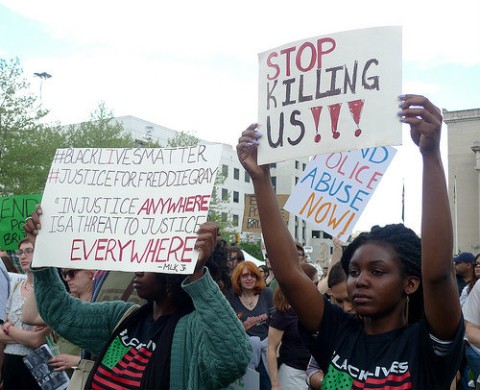Brutalized in Baltimore

When the Baltimore protests escalated to looting and rioting, condemnations were swift. For many politicians and commentators, the issue was clear: while people have a right to protest the April 19 death of Freddie Gray from injuries sustained in police custody, there’s no excuse for arson and brick throwing.
This questioning of demonstrators’ tactics served mostly to distract attention from the city’s long-standing pattern of police violence and the deep inequalities that have denied many African Americans economic and educational opportunity. “Peace, peace” cry the authorities—but there is no peace in West Baltimore, where the people have been brutalized since long before a young black man decided to pick up a brick.
Read our latest issue or browse back issues.
In 2014, the Baltimore Sun found that in four years the city had paid damages or settlements in 102 police brutality lawsuits. One victim was an elderly woman whose bones were broken when an officer roughed her up for refusing a warrantless search after her grandson was shot. Another was a pregnant woman thrown to the ground after she witnessed an assault and urged officers to pursue the perpetrators. The total bill to taxpayers: $5.7 million. Imagine what good the city could do with that money if it didn’t have to spend it compensating for the bad.
By the time of Gray’s needless arrest and death, his part of town was awash in legitimate grievances against the police. Protests remained mostly peaceful—and the exceptions to this, while not defensible, are a predictable reaction within a community traumatized by the people sworn to protect it. When Police Commissioner Anthony Batts called for protests to remain nonviolent, his voice had lost whatever moral authority it once had.
Prosecutor Marilyn J. Mosby’s decision to bring charges against six officers involved in Gray’s death has helped calm tensions. It has been received as a bold move in a nation where investigations of police conduct are slow and officers are rarely held accountable, not even when they recklessly cause the death of someone they shouldn’t have arrested in the first place.
It’s far from clear that Mosby will win convictions. Even if she does, it won’t bring Gray back or end Baltimore’s deeper injustices. But perhaps it will be a step toward restoring people’s faith in their own leaders—and in a system meant to place no one above the law’s demands nor below its protections.





